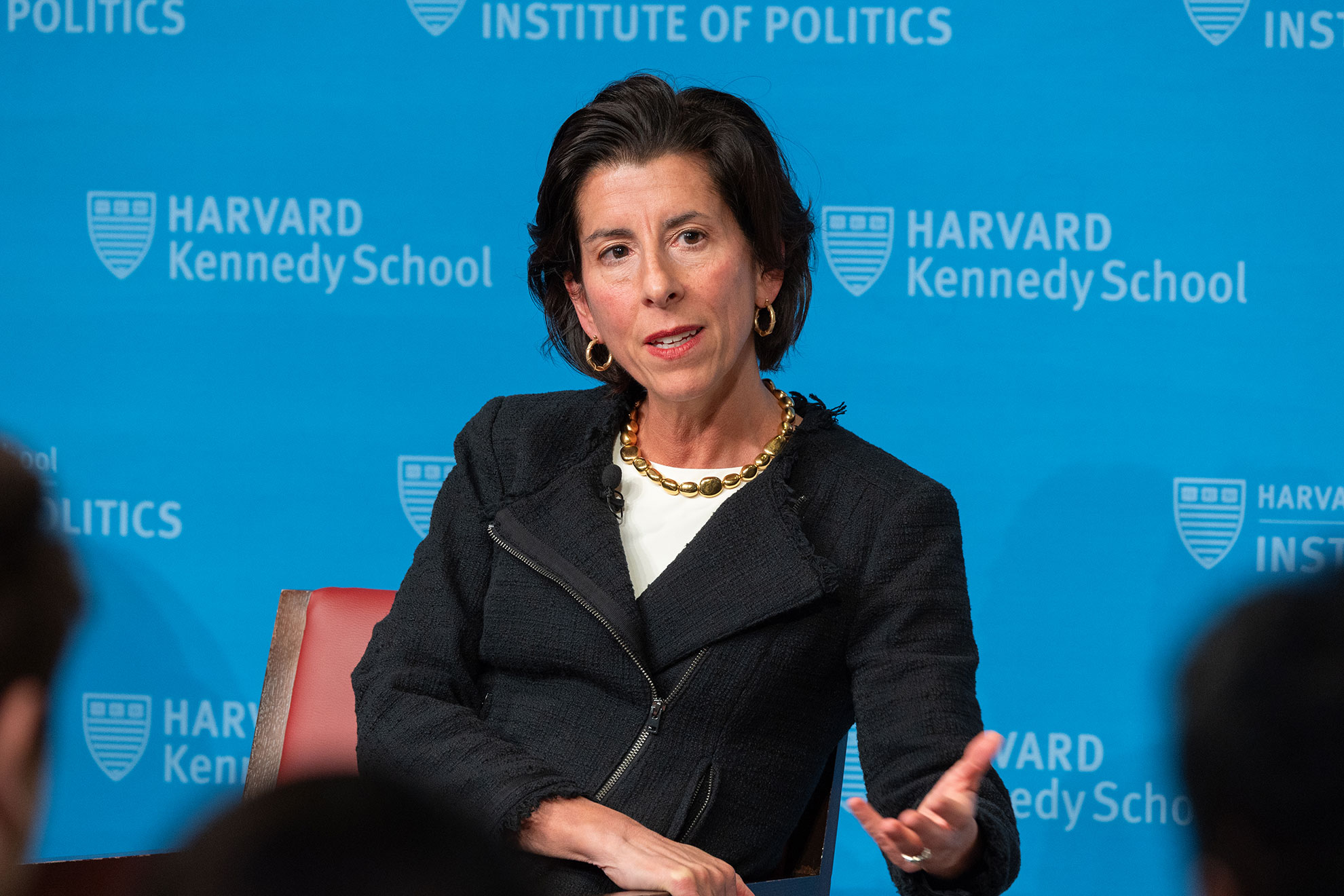Gina Raimondo, the former U.S. Commerce Secretary, has made waves with her innovative policies that aim to boost economic growth while ensuring fairness for working Americans. During her tenure under the Biden administration, she implemented significant infrastructure initiatives and economic stimulus measures designed to enhance America’s competitiveness. Known for advocating supply chain management reform, Raimondo emphasized collaboration with international partners to strengthen critical supply chains affected by the pandemic. Her achievements in the Biden administration reflect a strong commitment to creating jobs and enhancing the nation’s economy. With a focus on delivering tangible results, Gina Raimondo stands out as a dynamic leader in modern American politics.
In the ever-evolving landscape of U.S. politics, Gina Raimondo has emerged as a pivotal figure in shaping economic policies and infrastructure improvements. As a key player in the Biden administration’s efforts to revitalize the economy, her strategic approach to supply chain issues has garnered attention nationwide. By advocating for comprehensive economic stimulus plans, she has worked to ensure that communities across America benefit from robust economic support. Raimondo’s commitment to enhancing competitiveness further underscores her role as a transformative leader in addressing the challenges facing the modern economy. As discussions around labor markets and job creation continue, her insights remain influential in the quest for a more equitable economic future.
Gina Raimondo’s Bold Policy Changes
Gina Raimondo’s approach to governance has consistently showcased her determination to bring about meaningful change. Notably, during her tenure as the Governor of Rhode Island, she implemented several groundbreaking policies aimed at revitalizing the state’s economy. By cutting taxes annually, raising the minimum wage, and making community college tuition-free, she actively worked to create a fairer economic landscape. Her willingness to reduce regulations by 30 percent demonstrates her belief that government should facilitate innovation and not hinder it. Such transformative policies reflect Raimondo’s commitment to enhancing opportunities for all, marking her as a trailblazer in public service.
Raimondo’s steadfast conviction that the traditional approach to governance requires reevaluation is evident in her remarks about the necessity of breaking conventional molds to foster progress. She believes that the focus should always be on ensuring that changes do not harm ordinary people. As she stated, execution is critical when implementing changes, thereby encapsulating her philosophy of balancing ambition with responsibility. This focus on fairness and opportunity is a testament to her deep-rooted belief that government should work for all citizens, particularly those often overlooked.
Achievements as U.S. Commerce Secretary
As the U.S. Commerce Secretary under the Biden administration, Gina Raimondo has played a pivotal role in reshaping the landscape of American commerce, particularly in the wake of the COVID-19 pandemic. Her tenure has been marked by strategic initiatives to improve supply chain management, which became drastically challenged during the health crisis. By prioritizing the understanding of complex supply chains, Raimondo spearheaded efforts to build collaborative relationships with countries in Southeast Asia, exemplifying her commitment to enhancing U.S. economic competitiveness through international partnerships.
Moreover, her advocacy for the CHIPs and Science Act has cemented her legacy by addressing the pressing issue of semiconductor dependence on foreign nations, particularly China. Raimondo’s focus on national security implications of semiconductor production shows her foresight and dedication to America’s technological sovereignty. By outlining ambitious goals such as producing a quarter of the leading-edge chips domestically by 2030, she has set a clear pathway for the U.S. toward achieving self-reliance in critical technological components.
Biden Administration Infrastructure Investments
Gina Raimondo was instrumental in shaping the Biden administration’s Infrastructure Investment and Jobs Act, which aims to modernize the nation’s infrastructure. Understanding the link between infrastructure and economic growth, her commitment to this initiative is rooted in a belief that robust infrastructure lays the groundwork for job creation and innovation. By promoting investments in roads, bridges, and broadband, she has emphasized the importance of preparing the U.S. for future economic challenges and ensuring that every American has access to essential services.
Raimondo’s efforts align with the broader goals of the Biden administration, which seeks to revive the economy post-pandemic while addressing long-standing inequalities. By advocating for infrastructure spending, she has not only prioritized recovery but also aimed to create jobs in sectors that have historically been the backbone of the American economy. This dual focus on immediate economic stimulus and long-term growth reflects her strategic vision for a sustainable economic model that benefits all segments of society.
Supply Chain Management Insights
The COVID-19 pandemic exposed vulnerabilities in global supply chains, and Gina Raimondo’s response as Commerce Secretary has been critical in addressing these issues. She initiated comprehensive analyses to map out essential supply chains, allowing the government to pinpoint weaknesses and coordinate responses effectively. By creating strategic partnerships with international allies, particularly in Southeast Asia, she facilitated a collaborative approach to rebuilding and strengthening supply chains, which is essential for America’s economic robustness.
Furthermore, Raimondo acknowledged the importance of producing critical goods domestically to reduce reliance on foreign entities. Her leadership in the CHIPs and Science Act reflects her understanding of the interconnectedness of supply chain management and national security. By advocating for policies that bolster domestic manufacturing capabilities, she is working towards enhancing the resilience of U.S. supply chains against future disruptions, ensuring that the American economy can withstand global challenges.
Economic Stimulus Measures during Crisis
Gina Raimondo played a significant role in the execution of the Biden administration’s economic stimulus measures, which were designed to mitigate the severe economic impact of the COVID-19 pandemic. As a former governor, she understood firsthand the urgency of providing immediate relief to citizens facing unemployment and economic instability. Her experience helped shape effective stimulus strategies that aimed to put money back into the hands of those in need, ensuring that the economy could recover swiftly from the downturn.
While some critics have associated the stimulus with rising inflation, Raimondo argues that the alternative—inaction—could have been disastrous. By recalling her tenure during the height of the pandemic, she highlights the need for bold action to prevent rampant unemployment. Her approach to integrating social programs with economic recovery efforts emphasizes a holistic strategy to stimulate the labor market, particularly by addressing workforce shortages through childcare initiatives, which illustrates her commitment to fostering inclusive economic growth.
Gina Raimondo’s Vision for Future Competitiveness
Gina Raimondo has consistently vocalized her vision for enhancing U.S. competitiveness on the global stage, rooted in innovation, education, and workforce development. During her tenure, she emphasized the necessity of preparing the American workforce for the jobs of tomorrow—especially in high-demand industries like technology and green energy. She advocates for policies that invest in education and training, ensuring that U.S. workers have the skills needed to thrive in an evolving economy, crucial for maintaining a competitive edge.
Raimondo’s experiences drawn from her immigrant background and working-class family life inform her understanding of the challenges faced by average Americans. This perspective fuels her commitment to enacting comprehensive changes in policy that promote economic equity and provide opportunities for all. By championing initiatives aimed at diversifying the workforce and ensuring fair access to high-quality jobs, she aims to cultivate a more resilient and inclusive economy that can better compete internationally.
Balancing Progress and Responsibility
Throughout her career, Gina Raimondo has navigated the delicate balance between enacting progressive policies and ensuring that they do not adversely affect the populace. Her pragmatic approach to governance recognizes that change can be disruptive, and her commitment to minimizing negative impacts illustrates a thoughtful leadership style. By advocating for fiscal responsibility within ambitious policy frameworks, she ensures that the initiatives undertaken are sustainable and beneficial for future generations.
This balanced perspective is necessary in an era marked by rapid change and uncertainty. Raimondo highlights the importance of listening to diverse viewpoints, even as she pushes for transformative policies. Her emphasis on dialogue and collaboration reflects a commitment to democratic principles, allowing for constructive discourse that can lead to innovative solutions. This approach not only fosters greater trust in government but also helps build coalitions that are essential for implementing effective policy change.
Gina Raimondo’s Legacy of Leadership and Reform
Gina Raimondo’s leadership has left an indelible mark on her constituents and the broader landscape of American governance. Her innovative policies as governor and later as U.S. Commerce Secretary reflect her commitment to fostering economic growth, enhancing competitiveness, and prioritizing the needs of everyday Americans. Through bold actions such as tax reforms and significant infrastructure investments, she has demonstrated that effective governance requires both vision and tenacity.
Moreover, her legacy of reform emphasizes the necessity of adapting to the changing realities of the global economy. By taking proactive steps to address supply chain challenges and championing technology investments, Raimondo has positioned herself as a key figure in the future trajectory of American economic policy. As she continues to influence the conversation around economic growth and equity, her commitment to public service ensures that the interests of the American people remain at the forefront of policy decisions.
Future Prospects for Economic Policy under Gina Raimondo
Looking to the future, Gina Raimondo’s economic policies aim to foster resilience and inclusivity in the American economy. Her strategic foresight suggests a continued focus on infrastructure, technology, and workforce development as key pillars of growth. By advocating for comprehensive economic policies that benefit all sectors of society, she sets a standard for future leaders to follow—a focus not only on immediate results but also on long-term sustainability and equity.
Raimondo’s ongoing work in the Biden administration signals a dedication to addressing complex challenges through innovative solutions. As issues like inflation and global competition continue to evolve, her emphasis on strategic partnerships, both domestically and internationally, will be crucial in reclaiming the U.S.’s place as a leader in the global market. By maintaining a balanced approach that prioritizes both growth and fairness, she ensures that the economic policies implemented today will lay a strong foundation for future generations.
Frequently Asked Questions
What are Gina Raimondo’s major policies as U.S. Commerce Secretary?
As U.S. Commerce Secretary, Gina Raimondo focused on enhancing supply chain management, promoting domestic semiconductor production through the CHIPs and Science Act, and spearheading economic stimulus measures to recover from pandemic-related disruptions. Her policies emphasized fiscal responsibility, ensuring private-sector investment in tandem with public spending.
How did Gina Raimondo contribute to the Biden administration’s infrastructure initiatives?
Gina Raimondo played a pivotal role in shaping the Biden administration’s Infrastructure Investment and Jobs Act, which aimed to boost economic stimulus measures while ensuring that investment was paired with private sector funds, achieving a ratio of $13 from private investments for every public dollar spent.
What achievements did Gina Raimondo have as Rhode Island Governor that influenced her work as U.S. Commerce Secretary?
During her tenure as the Governor of Rhode Island, Gina Raimondo achieved significant tax cuts, increased the minimum wage, and made community college tuition-free. These achievements reflected her commitment to economic growth and fairness, which she carried into her role as the U.S. Commerce Secretary.
How has Gina Raimondo addressed supply chain issues during her time as U.S. Commerce Secretary?
Gina Raimondo addressed supply chain issues by analyzing critical supply chains and collaborating with international partners to strengthen relationships with countries like Indonesia and the Philippines. Her proactive approach helped tackle the complexities of supply chain disruptions exacerbated by the COVID-19 pandemic.
What are the economic stimulus measures supported by Gina Raimondo?
Gina Raimondo supported substantial economic stimulus measures during her time as U.S. Commerce Secretary, particularly in response to the pandemic. She emphasized the importance of these measures in preventing prolonged unemployment, advocating for a balanced approach that included social programs to support the labor market.
What role did Gina Raimondo play in enhancing U.S. semiconductor production?
Gina Raimondo was instrumental in the CHIPs and Science Act, which focuses on increasing domestic semiconductor production to ensure national security and reduce reliance on overseas manufacturing, particularly from China. She projected that by 2030, the U.S. would produce a quarter of the leading-edge chips essential for advanced technologies.
How did Gina Raimondo relate her immigrant family background to her political motivations?
Gina Raimondo’s immigrant family background instilled in her the values of hard work and fairness. Her experiences growing up motivated her to advocate for opportunities for regular Americans, emphasizing the need to support the ‘little guy’ as she entered the political arena.
What critiques has Gina Raimondo faced regarding her policies during her tenure as Commerce Secretary?
Gina Raimondo has faced critiques regarding the pace and impact of her policies, particularly some argue that compromises may have diluted the effectiveness of economic measures. However, she defends her record by highlighting the challenges of achieving progress within a closely divided Congress.
What initiatives did Gina Raimondo support to improve labor market participation?
Gina Raimondo supported initiatives that aimed to foster inclusive workforce participation, particularly women’s involvement, through economic measures that included childcare plans. She viewed these as essential components to ensure companies had access to the necessary workforce.
How did Gina Raimondo assess the impact of COVID-19 on employment during her leadership?
Gina Raimondo reflected on the alarming spike in unemployment during COVID-19, recalling her experience managing a significant rise in unemployment claims in Rhode Island. She emphasized the critical need for economic stimulus measures to facilitate a swift recovery and prevent ongoing job losses.
| Key Topic | Details |
|---|---|
| Positive Change | Change often involves breaking some norms, as emphasized by Gina Raimondo. |
| Economic Policies | During her governance, she cut taxes, raised the minimum wage, and made community college tuition-free. |
| Focus on Fairness | Raimondo stresses the importance of ensuring that change does not harm individuals. |
| Response to COVID-19 | Gina navigated supply chain challenges during the pandemic through strategic international relationships. |
| Legislative Achievements | Under Biden, she championed the CHIPs Act to bolster U.S. semiconductor production. |
| Economic Strategy | For every dollar of government spending, $10 from the private sector was leveraged. |
| Bipartisan Challenges | Acknowledgment of compromises made while passing legislation in a divided government. |
| COVID Stimulus Debate | Defended the stimulus as essential to prevent higher unemployment despite inflation concerns. |
| Labor Market Programs | Linked social programs to economic success, emphasizing labor market participation. |
Summary
Gina Raimondo has proven to be a pivotal figure in reshaping U.S. economic policies through her tenure as the former U.S. Commerce Secretary. By advocating for progressive changes, she highlights that true improvement often requires breaking existing barriers while ensuring that the process remains equitable for all individuals. Her strategies during the COVID-19 pandemic illustrate a proactive approach to complex economic challenges, prioritizing partnerships, and responsible fiscal policies that resonate with the current socio-economic climate. As the nation moves forward, the insights and strategies offered by Gina Raimondo will undoubtedly influence future policymakers aiming for a balanced and fair economy.







